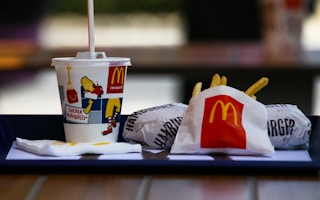Burgers, fries, and milkshakes from McDonald’s may still have the same calorie count, but their environmental impact is set to shrink following an announcement by the fast food giant on Tuesday that it plans to eliminate deforestation from its global supply chains by 2030 at the latest.
To continue reading, subscribe to Eco‑Business.
There's something for everyone. We offer a range of subscription plans.
- Access our stories and receive our Insights Weekly newsletter with the free EB Member plan.
- Unlock unlimited access to our content and archive with EB Circle.
- Publish your content with EB Premium.
McDonald’s says its commitment is effectively immediately and it will begin work to ensure nothing in its supply chain is linked to deforestation. It will prioritise products such as beef, coffee, palm oil, poultry, and paper packaging.
The company’s announcement follows recent promises by Yum! Brands (which owns food chains like Kentucky Fried Chicken and Pizza Hut), Dunkin’ Donuts and Krispy Kreme, to ensure that the palm oil they use are not grown on illegally cleared forest land.
McDonald’s move was welcomed by environmental campaigners, with Greenpeace noting that the company is the first among fast food companies to pledge to eliminate deforestation across its entire global supply chain.
“This policy sets a new benchmark for the fast food industry, although McDonald’s still needs to set clear deadlines for delivering on its promises to ensure that change really happens on the ground,” said Greenpeace in a statementon Thursday.
Lael Goodman, analyst at American think-tank Union of Concerned Scientists’ Tropical Forest and Climate Initiative, added: “McDonald’s announcement has the potential to create a ‘new normal,’ where fast food brands sourcing forest-produced commodities demand deforestation-free products.”
McDonald’s will announce time-bound deforestation-free targets for each of its commodities this year, and that this commitment is applicable to its entire supply chain, which includes 3,100 direct suppliers and a wider network of indirect providers.
Its vendors will have to prove that no deforestation is carried out on primary forests or areas of high conservation value, that peatlands are left untouched, human rights are upheld, and that the rights of local communities are respected, among other rules.
David McLaughlin, vice president of sustainable food, World Wide Fund for Nature (WWF), said that “this will lead to real conservation impacts on the ground, and we hope that this commitment will inspire other companies to take action”.
With more than 36,200 outlets in almost 120 countries around the world, McDonald’s is one of the world’s largest fast food companies. It has over the years been the target of numerous activist campaigns on issues such as food safety, nutrition, and the environment.
For example, Greenpeace campaigners in 2006 released numerous reports outlining how McDonald’s was driving deforestation in the Amazon rainforest in South America through its purchase of soya beans from global agribusiness Cargill. These beans were grown on cleared forest land, Greenpeace had alleged.
“
McDonald’s announcement has the potential to create a ‘new normal,’ where fast food brands sourcing forest-produced commodities demand deforestation-free products.
Lael Goodman, analyst, Union of Concerned Scientists
The soya beans were used as animal feed for the chickens, pigs, and cows that end up in McDonald’s burgers and nuggets.
As a result of the campaign, McDonald’s eventually stoped buying animals fed on soya beans grown on newly-deforested areas of the Amazon.
While McDonald’s has taken steps to address the soya beans issue since the activist campaign, Greenpeace noted in its statement that “plenty of its competitors have made no effort to address their beef, poultry or soy supply.”
The company’s other efforts include a pledge to begin purchasing ‘verified sustainable’ beef and coffee by 2016 and 2020 respectively, using paper packaging from recycled or sustainable sources, and use 100 per cent sustainable palm oil by 2020.
McDonald’s also signed the New York Declaration on Forests at last year’s UN Climate Summit, where companies pledged to help achieve the global goal of cutting forest loss by half by 2020, and ending it altogether by 2030.
Other signatories included consumer goods giants Unilever and Procter & Gamble, and palm oil companies Wilmar and Sime Darby.
Francesca DeBiase, senior vice president of McDonald’s worldwide supply chain and sustainability, said that the company’s latest commitment to end deforestation “demonstrates another major step for McDonald’s as we work to increasingly embed sustainability throughout our global business”.
“Making this pledge is the right thing to do for our company, the planet and the communities in which our supply chain operates,” she added.
Despite the optimising surrounding this commitment, observers noted that the true measure of its worth will be in its implementation.
“To force real change, McDonald’s must demonstrate real action in the form of strong individual commodity commitments and on-the-ground follow through, said Goodman.










